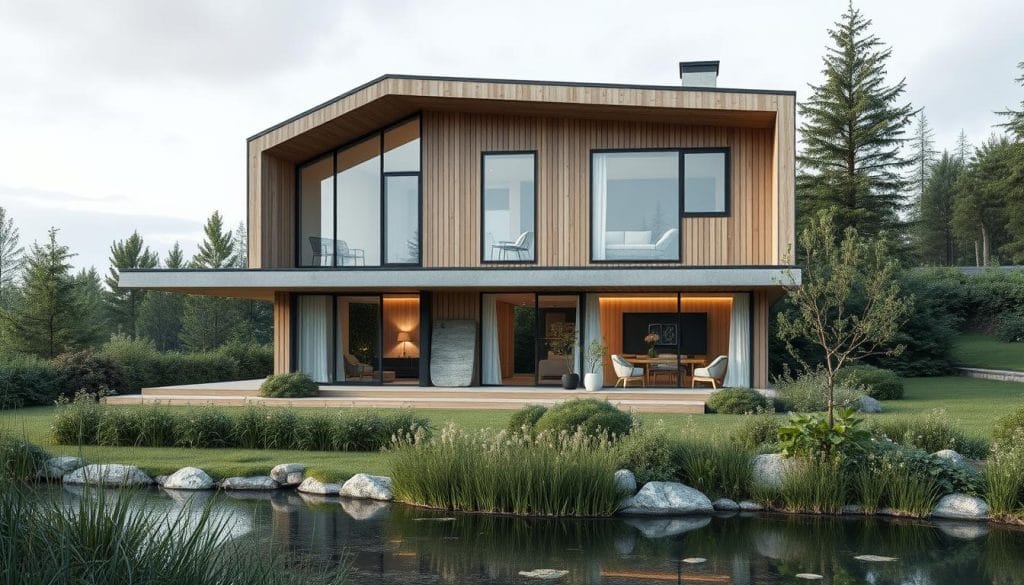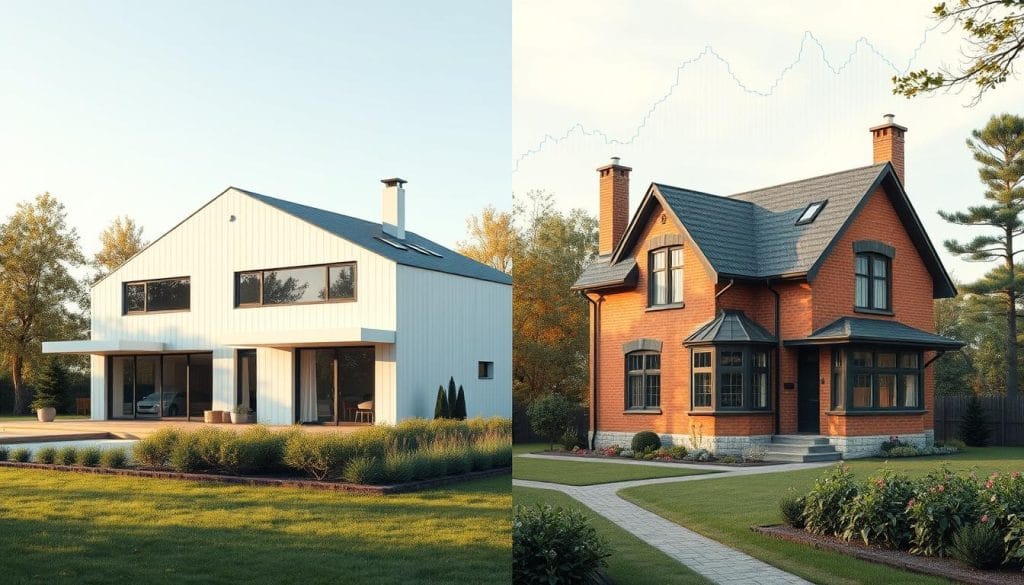Looking into the cost of luxury prefab houses reveals the blend of high-end design and modern construction. These homes mix traditional elegance with prefab’s eco-friendly benefits. The cost depends on materials, custom features, location, and site prep.
The starting price for a luxury prefab house can be around £150,000 for smaller models. For larger, custom homes, the cost can go over £800,000. It’s key to think about the base price and any upgrades or special features. For example, luxury finishes like marble and smart tech can raise the cost. The HUF HAUS models show how sustainability and high-end features add to the price.
Key Takeaways
- The price of a luxury prefab house starts at about £150,000 and can exceed £800,000 depending on customisation and material choices.
- High-end finishes such as hardwood flooring and smart home technology can considerably increase the luxury prefab house price.
- Transporting large modules and material shipping costs, specially cross-country, can add tens of thousands to the final bill.
- Site preparation, including land purchase and preparation costs, must be factored into the overall cost evaluation.
- Features like energy-efficient windows, sustainable materials, and security systems are vital considerations for a higher standard of living.
Understanding Luxury Prefab Homes
Luxury prefab homes are a mix of style and practicality. They use the latest materials and tech. This makes them eco-friendly without losing quality or comfort.

Definition of Luxury Prefab Houses
Luxury prefab houses stand out with their fancy features and design. They have big, open spaces and lots of natural light. They also have smart home tech and top-notch materials.
The cost of a bespoke modular home depends on what you choose and how custom it is.
Key Features of Luxury Models
Luxury prefab homes have many special features. These include:
- Big windows for lots of natural light and great views.
- Smart home tech for easy control of lights, heat, and security.
- Designer touches for a fancy look and feel.
- Green building materials and energy-saving systems.
The price of these high-end homes varies. Basic kit homes start at £31,000. But, bigger and fancier homes can cost up to £92,000.
As more people want luxury prefab homes, it’s good to look around. You can find the perfect home that fits your style. For more info, check out our guide on prefab homes.
Factors Influencing Cost
When looking at luxury prefab homes, it’s key to understand what affects their price. Things like location, site prep, materials, construction methods, and custom features all play a part. These factors can change the cost a lot.

Location and Site Preparation
The place where you build matters a lot. Sites that need a lot of digging or fixing can cost more. Also, the price of the land and local rules can raise the price.
Things like legal fees and getting utilities ready can add up too. These costs are important to think about.
Materials and Construction Techniques
The price of a high-end portable house depends on the materials and how it’s built. Using top-notch materials like special windows and insulation can save money in the long run. These features might cost more upfront but can lower bills later.
Building prefab homes can save money because they need less labour and take less time. For example, Winton prefab homes can save buyers 10% to 15% on the price.
Design and Customisation Options
The cost of a bespoke modular home goes up with customisation. Making a home unique can mean spending on fancy finishes and special layouts. Whether you choose a smaller or larger home, making it your own will cost more.
Building during the off-season or buying interiors early can help keep costs down. This is good to know.
For more on affordable prefab homes, check out affordable prefab models.
For info on buying a modular home with land, visit Prefab Market.
Comparison with Traditional Construction
Looking at the cost of bespoke modular homes versus traditional construction, several key factors come into play. Luxury prefab houses offer efficiency and cost savings due to their production process.

Cost Differences
Building a traditional house can be expensive, with unexpected costs adding up. In Spain, traditional houses take 10 to 12 months to build. They cost between 1,200 to 2,000 euros per square metre.
In contrast, prefab houses cost between 700 to 1,800 euros per square metre. This is a big saving. Factory production cuts down on labour and material waste, making costs more stable.
Time to Completion
Modular construction is quick, unlike traditional building. Weather and scheduling issues can delay traditional builds. But prefab homes are built in 3 to 7 months, thanks to factory work.
This speed not only lowers the cost but also shortens the time needed for financing. It means homeowners save money and stress.
Modular homes also offer a predictable timeline, giving homeowners peace of mind. This is unlike the uncertainty of traditional builds. It means less disruption for homeowners too.
In summary, while both methods are sustainable and energy-efficient, modular homes are more cost-effective and timely. They suit today’s homeowners who value efficiency and savings.
Financing and Budgeting Options
Understanding the cost of a luxury prefab house involves looking at financing and budgeting options. Knowing your choices can greatly affect your investment in a prebuilt house.
Mortgage Considerations
In the UK, banks now offer special mortgages for prefab homes. These mortgages consider the unique aspects of modular construction. This ensures buyers can find financing that meets their needs.
Grants and Incentives
The UK government supports building eco-friendly homes with grants and incentives. These can lower the cost of a luxury prefab house. Homeowners can save money and live sustainably.
Case Studies from Notable Builders
Looking at projects from famous builders can help with budgeting. Companies like Huf Haus and Baufritz have lots of experience. Their projects show how to manage costs and add custom features.
Trends in Prefab Housing Design
Keeping up with design trends is key when considering prefab house costs. New features like SIPs and Passivhaus standards improve energy efficiency. Solar panels, underfloor heating, and wood stoves are also common. These features make homes luxurious, efficient, and cost-effective.




